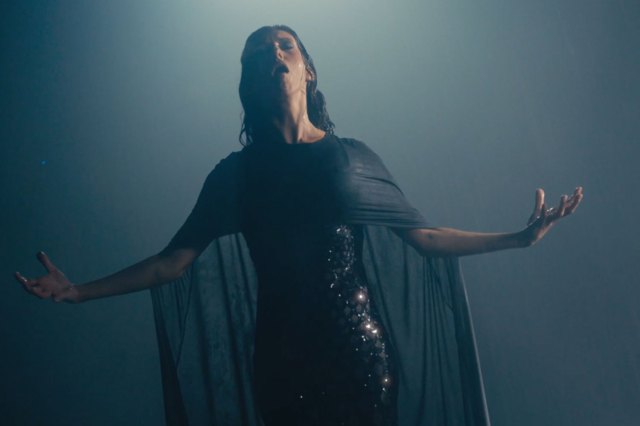Review: Julie (National Theatre)
Vanessa Kirby stars in Polly Stenham’s reworking of August Strindberg’s ”Miss Julie”

© Richard H Smith
August Strindberg is still with us, 130 years on. Miss Julie remains a play for our times. Its upstairs-downstairs order survives in our own age of inequality and, in Polly Stenham's sleek, satirical update, starring The Crown's Vanessa Kirby, rich and poor rub shoulders at a huge Hampstead house party. Only the hostess and her chauffeur rub rather more than just that…
All of Strindberg is there in Stenham's adaptation – sex and death, wealth and work, beauty and mess – even if it's all a bit by the book. As brilliant young things in fabulous frocks get their rocks off at a lavish, well-to-do rave, liberally dusted with glitter and cocaine, the staff slave around them in the kitchen below: binning bottles, dusting cakes, finishing off the dregs. Kirby's louche but lonesome Julie, gurning her face off, completely unself-aware, retreats from the do to keep company with those in her father's employ: housekeeper Kristina (Thalissa Teixeira) and her gym-toned fiancée, Jean (Eric Kofi Abrefa), who's Julie's father's driver. They make a tangled triangle, status and power constantly shifting between them.
Stenham cleverly stretches the social divide to envelope globalisation – Jean's originally from Cote d'Ivoire; Kristina's Brazilian – so that Strindberg suddenly seems sharply intersectional. The privileges of race, wealth and gender shuffle things up. "You look like you're going to court," Julie says of Jean's suit, but her words only ping off the colour of his skin. He, in turn, berates Kristina that the dinner she's saved him should be cold.
It is, at once, an update and not: a classic beneath a contemporary skin. Stenham's dialogue is too eloquent and in control to convince, yet too sewn into its situation to acknowledge itself as theatre. What it does – brilliantly – is tap into the tragedy. You know, right from the start, how this plays out. There's too much heat between Julie and Jean for them to resist one another, and too much tying them down for that not to go wrong. They are, as Kristina wryly observes, "all hostage to our situation" – and it's horrible. Tom Scutt's design is a prison of privilege; an ivory tomb.
Strindberg's characters are all contradiction, and Stenham holds to that, as do her cast – so much so that all three could be the lead. Kirby's probably too cast to type – cut-glass is her daily bread – but she swings on a sixpence from composure to collapse, and entices our sympathy without letting Julie off the hook. She's hateful and pitiable; a woman with everything and nothing at once, robbed of purpose by privilege.
Abrefa's the opposite: Jean's consumed by his drive, and determined to take whatever he can get, Julie included. When he swills a stolen vintage, his pleasure's in the poise more than the plonk. Teixeira's Kristina keeps her head down with a saintly patience, but she lets you see the strain it takes her to keep schtum. Something has to give – and it does.
Even so, it's too polished, too glossy for its own good – much like Julie herself. Carrie Cracknell's staging is Sunday supplement stylish, with Ann Yee's choreography a snapshot of excess, but then this is a play about beautiful people and their butterfly lives, and Cracknell knows it. A frame of light reprimands us for watching lives torn apart and, at one point, Kirby tiptoes onto a box like a statue on a plinth – another status symbol in a well-furnished home.
It's an eagle-eyed image – all beauty and death – and the two things do battle throughout. There are uprooted flowers and empty cages, and against all of life's pleasures, there's a constant disdain for life itself. That, in the end, is the tragedy here. No amount of privilege protects us from death.



















